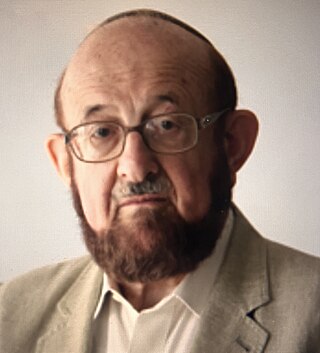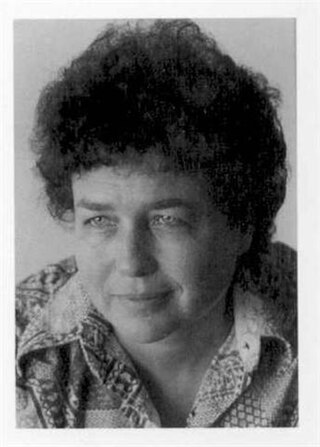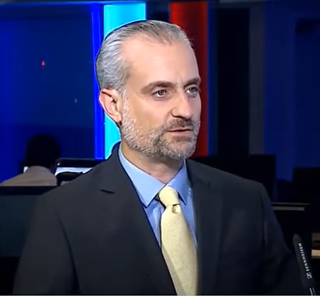Gil Troy is an American presidential historian and a popular commentator on politics and other issues. He is a professor of history at McGill University. Troy is the author of nine books, and the editor of two. He writes a column for The Daily Beast on forgotten history, putting current events in historical perspective and is a columnist for The Jerusalem Post.

Tikkun is a quarterly interfaith Jewish left-progressive magazine and website, published in the United States, that analyzes American and Israeli culture, politics, religion, and history in the English language. The magazine has consistently published the work of Israeli and Palestinian left-wing intellectuals, but also included book and music reviews, personal essays, and poetry. In 2006 and 2011, the magazine was awarded the Independent Press Award for Best Spiritual Coverage by Utne Reader for its analysis of the inability of many progressives to understand people's yearning for faith, and the American fundamentalists' political influence on the international conflict among religious zealots. The magazine was founded in 1986 by Michael Lerner and his then-wife Nan Fink Gefen. Since 2012, its publisher is Duke University Press. Beyt Tikkun Synagogue, led by Rabbi Michael Lerner, is loosely affiliated with Tikkun magazine. It describes itself as a "hallachic community bound by Jewish law".
Robert Bernard Alter is an American professor of Hebrew and comparative literature at the University of California, Berkeley, where he has taught since 1967. He published his translation of the Hebrew Bible in 2018.
Amotz Asa-El is a bestselling Israeli author and award-winning journalist, The Jerusalem Post's senior commentator and former executive editor, and a fellow at the Hartman Institute.
Meron Benvenisti was an Israeli political scientist who was deputy mayor of Jerusalem under Teddy Kollek from 1971 to 1978, during which he administered East Jerusalem and served as Jerusalem's chief planning officer. He supported a binational Israeli–Palestinian state.

Avishai Margalit is an Israeli professor emeritus in philosophy at the Hebrew University of Jerusalem. From 2006 to 2011, he served as the George F. Kennan Professor at the Institute for Advanced Study in Princeton.

Abba Ahimeir was a Russian-born Jewish journalist, historian, and political activist. One of the ideologues of Revisionist Zionism, he was the founder of the Revisionist Maximalist faction of the Zionist Revisionist Movement (ZRM) and of the clandestine Brit HaBirionim.

Haym Soloveitchik is an American Modern Orthodox rabbi and historian. He is the only son of Rabbi Joseph B. Soloveitchik. He graduated from the Maimonides School which his father founded in Brookline, Massachusetts and then received his B.A. degree from Harvard College in 1958 with a major in History. After two years of post-graduate study at Harvard, he moved to Israel and began his studies toward an M.A. and PhD at the Hebrew University in Jerusalem, under the historian Professor Jacob Katz. He wrote his Master's thesis on the Halakha of gentile wine in medieval Germany. His doctorate, which he received in 1972, concentrated on laws of pawnbroking and usury. He is known to many as Dr. Gra"ch, after his great-grandfather for whom he is named, Rabbi Chaim Soloveitchik, who was known as the Gra"ch.

Israel Eldad, was an Israeli Revisionist Zionist philosopher and member of the Jewish underground group Lehi in Mandatory Palestine.

Avraham Granot was a Zionist activist, Israeli politician and a signatory of the Israeli declaration of independence.

Yaron Ezrahi was an Israeli political theorist and philosopher, professor at The Hebrew University of Jerusalem, a senior Fellow at the Israel Democracy Institute in Jerusalem, and a public intellectual. Ezrahi was known for his work on the relations between modern science and the rise of the modern liberal democratic state and the political uses of scientific knowledge and authority. His late work focuses on the deterioration of the Enlightenment version of the partnership between science, technology and democracy, the changing parameters of postmodern imaginaries, and performances of the democratic order. His books, written in English and Hebrew, were translated into German and Chinese.

Ruth Kark is an Israeli historical geographer and professor of geography at the Hebrew University of Jerusalem. Professor Kark is a well-known researcher and expert in the field of the historical geography of Palestine and Israel.

Shneor Zalman Abramov was an Israeli politician who served as a member of the Knesset between 1959 and 1977. As a writer he usually signed by using the acronym S.Z. Abramov.

Professor Alex Mintz, Director of the Computerized Decision Making Lab, and former Provost of IDC Herzliya, is a professor for decision-making in government, and former President of the Israeli Political Science Association.
Baruch Kimmerling was an Israeli scholar and professor of sociology at the Hebrew University of Jerusalem. Upon his death in 2007, The Times described him as "the first academic to use scholarship to reexamine the founding tenets of Zionism and the Israeli State". Though a sociologist by training, Kimmerling was associated with the New Historians, a group of Israeli scholars who question the official narrative of Israel's creation.
Moshé Machover is a mathematician, philosopher, and socialist activist, noted for his writings against Zionism. Born to a Jewish family in Tel Aviv, then part of the British Mandate of Palestine, Machover moved to Britain in 1968 where he became a naturalised citizen. He was a founder of Matzpen, the Israeli Socialist Organisation, in 1962.

Jacob M. Landau was Professor Emeritus in the Department of Political Science at the Hebrew University of Jerusalem.

Dr. Emmanuel Navon is a French-born Israeli political scientist, author and foreign policy expert who serves as CEO of the Israeli office of ELNET and who lectures at Tel-Aviv University. He is a senior fellow at the Jerusalem Institute for Strategy and Security (JISS) and a senior analyst for i24news.

Sidra DeKoven Ezrahi is Professor Emerita of Comparative Literature at the Hebrew University of Jerusalem.

Joseph and the Way of Forgiveness: A Biblical Tale Retold is a 2019 novel by Stephen Mitchell, retelling the story of Joseph from the Book of Genesis. Written in the style of a midrash, the novel expands on the Genesis narrative as it follows Joseph from adolescence to maturity, focusing on his thoughts and deep belief in Yahweh.














